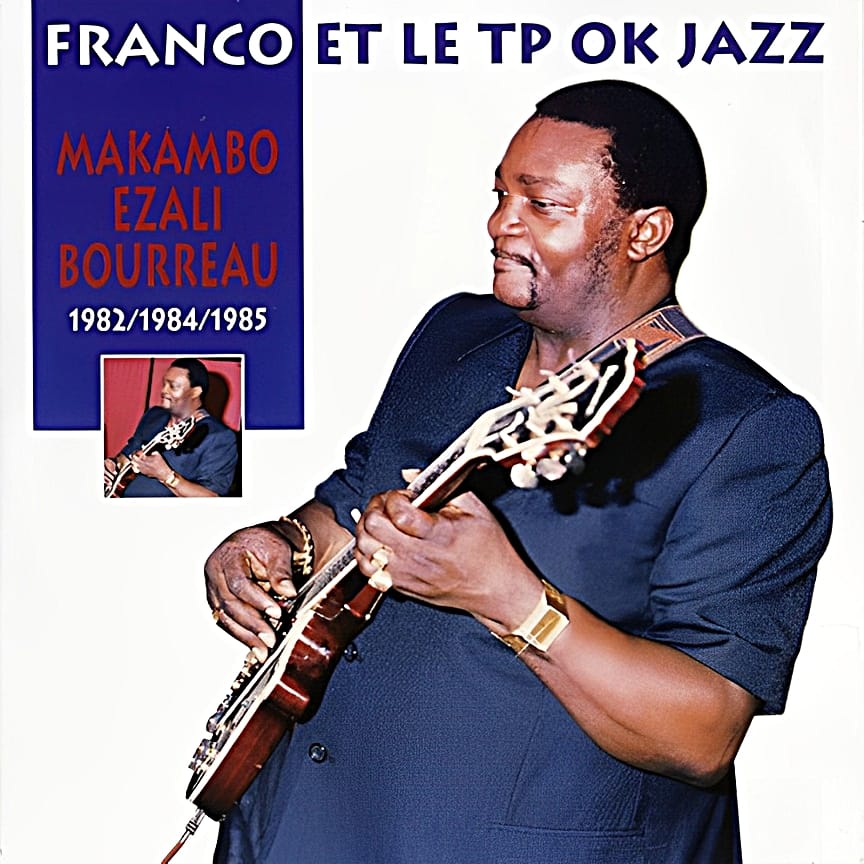
Franco Luambo: Celebrating His Legacy 35 Years Later
The Grand Maître of Congolese Music
François Luambo Luanzo Makiadi, known to the world as Franco, was a towering figure in Congolese and African music. Born on July 6, 1938, and passing on October 12, 1989, Franco’s influence extended far beyond the music stage. He was the driving force behind TPOK Jazz (Tout Puissant Orchestre Kinois Jazz), a band he led for over 30 years, making it one of the most influential African bands of all time. Known by many nicknames, including the “Sorcerer of the Guitar” and “Franco de Mi Amor,” he revolutionized African music and earned a reputation as a cultural icon in the Democratic Republic of Congo (formerly Zaire).
As we mark the 35th anniversary of his passing, we reflect on Franco’s indelible contributions to Congolese rumba, his role in shaping Africa’s musical landscape, and his enduring legacy.
Early Life: A Prodigy in the Making
Franco’s journey in music began early. Born into a modest family in Sona Bata, a small town in the Bas-Congo region of the Belgian Congo, he was captivated by the sound of guitars from a young age. At just 15 years old, he started performing with professional musicians, demonstrating a natural talent for the guitar that earned him the nickname “Sorcerer of the Guitar” due to his seemingly magical abilities to enchant audiences with his sound.
By the late 1950s, Franco had already established himself as a leading musician in Kinshasa, and by 1956, he co-founded TPOK Jazz, which would soon dominate the Congolese music scene.
The Rise of TPOK Jazz: Redefining African Rumba
Franco’s TPOK Jazz became a powerhouse of African music for over three decades. With Franco as the bandleader, the group combined elements of traditional Congolese music with Cuban rumba, creating a distinct sound that came to define Congolese rumba. Franco’s ability to innovate, blending the rhythmic essence of Cuban son with the melodic structures of African music, helped popularize rumba far beyond the borders of the Congo.
The band’s dynamic style, featuring a rich mix of guitars, horns, and vocal harmonies, and their ability to switch grooves mid-song, resonated with audiences across Africa. Franco’s guitar work, in particular, became emblematic of the genre, influencing generations of African musicians.
Political and Cultural Influence: The Voice of Zaire
Franco’s music was not just about entertainment—it became a tool for social and political commentary. In the 1970s, as Mobutu Sese Seko’s regime sought to promote an “authentic” African identity through the Authenticité movement, Franco became an advocate for the president’s vision. Franco even changed his name to L’Okanga La Ndju Pene Luambo Luanzo Makiadi to reflect this ideological alignment.
Songs like “République du Zaire” endorsed Mobutu’s policies, while others addressed social issues ranging from the hardships of daily life to the responsibilities of citizens. In doing so, Franco’s music reflected the complex political and cultural shifts of the time. Despite his alignment with Mobutu, Franco’s music remained a platform for addressing pressing societal issues, cementing his role as both a cultural icon and a voice of the people.
Musical Innovation: The Sorcerer of the Guitar
Franco’s guitar technique was legendary, earning him his famous nickname. His mastery of the instrument allowed him to weave intricate, lilting melodies that seemed to float effortlessly over the rhythmic backbone of TPOK Jazz. His songs often featured sudden shifts in rhythm and mood, a stylistic innovation that became a hallmark of his sound.
Franco’s ability to create long, complex compositions with layered guitar lines and rich vocal harmonies set him apart as a true innovator. His music was dynamic, fluid, and always evolving, much like the cultural landscape of Congo. Many of his songs, some lasting over 10 minutes, became epic journeys that captivated listeners.
Franco’s Legacy: A Lasting Impact on African Music
Franco’s passing in 1989 marked the end of an era in African music, but his influence continues to resonate today. His death was met with four days of national mourning in Zaire, and he was laid to rest in Gombe Cemetery, a site typically reserved for national heroes. His music lives on through the generations of African musicians he inspired, from Koffi Olomide to Fally Ipupa, and beyond.
In 2023, Franco was posthumously recognized when Rolling Stone ranked him at number 71 on its list of the 250 Greatest Guitarists of All Time, a testament to his enduring legacy in the world of music.
Conclusion: Remembering Franco Luambo, 35 Years On
Franco Luambo Makiadi was more than just a musician—he was a cultural leader, an innovator, and a voice for the people. His mastery of Congolese rumba and his ability to blend political and social commentary into his music cemented his status as a legend of African music. Thirty-five years after his passing, his music continues to inspire and resonate with audiences across Africa and around the world.
Franco’s legacy lives on, not only through his extensive body of work but also in the countless musicians and bands he influenced. As we celebrate his life and contributions to African music, we are reminded of the power of music to transcend borders, shape cultures, and influence societies.




Pingback: Mawalking Radio | Kiamuangana Verckys: Congolese Saxophonist and Visionary Music Pioneer
Pingback: Sam Mangwana: The Pigeon Voyageur of Congolese Rumba | Mawalking Radio
Pingback: Célestin “Célio” Kouka: A Pioneer of Congolese Rumba |
Pingback: Mayaula Mayoni: Congolese Maestro of Music and Art |
Pingback: Lola Checain: Icon of Congolese Soukous Excellence |